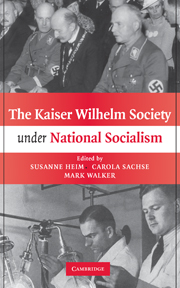Book contents
- Frontmatter
- Contents
- Tables
- Illustrations
- Editors
- Contributors
- Abbreviations
- Archives
- 1 The Kaiser Wilhelm Society under National Socialism
- SECTION I RESEARCH AND PERSONNEL POLICIES
- SECTION II RACIAL RESEARCH
- SECTION III EASTERN RESEARCH, LIVING SPACE, BREEDING RESEARCH
- 8 Kog-Sagyz – A Vital War Reserve
- 9 Raw and Advanced Materials for an Autarkic Germany: Textile Research in the Kaiser Wilhelm Society
- 10 Political Networking and Scientific Modernization: Botanical Research at the KWI for Biology and Its Place in National Socialist Science Policy
- SECTION IV MILITARY RESEARCH
- SECTION V THE POSTWAR “POLITICS OF THE PAST”
- Bibliography
- Index
9 - Raw and Advanced Materials for an Autarkic Germany: Textile Research in the Kaiser Wilhelm Society
Published online by Cambridge University Press: 29 July 2009
- Frontmatter
- Contents
- Tables
- Illustrations
- Editors
- Contributors
- Abbreviations
- Archives
- 1 The Kaiser Wilhelm Society under National Socialism
- SECTION I RESEARCH AND PERSONNEL POLICIES
- SECTION II RACIAL RESEARCH
- SECTION III EASTERN RESEARCH, LIVING SPACE, BREEDING RESEARCH
- 8 Kog-Sagyz – A Vital War Reserve
- 9 Raw and Advanced Materials for an Autarkic Germany: Textile Research in the Kaiser Wilhelm Society
- 10 Political Networking and Scientific Modernization: Botanical Research at the KWI for Biology and Its Place in National Socialist Science Policy
- SECTION IV MILITARY RESEARCH
- SECTION V THE POSTWAR “POLITICS OF THE PAST”
- Bibliography
- Index
Summary
“Everything in the soldier's armor that is not iron is chemistry – even the tunic.”
PRELIMINARY REMARKS
Materials research and armaments research generally evoke images of artifacts made of iron and metallic materials. Although metals research represents a considerable portion of such work, over history both types of research have covered a constantly growing catalog of raw materials. The introductory quotation, a common saying at the Reich Ministry of Economics (Reichswirtschaftsministerium, RWM) during the National Socialist period, points to the importance of the chemical industry, and within this sector, expressly to the field of synthetic fibers and plastics. Research into raw and advanced materials is highly relevant for industry in all mass consumption societies, and even more so for national economies lacking raw materials. The greatest trade expense for industrialized European countries during the nineteenth and early twentieth centuries was always the import of textile raw materials, amounting to around one third of the cost of all commercial and industrial imported raw materials. Despite numerous successful innovations in the area of advanced textile materials research during World War I, by the end of the Weimar Republic more than 90 percent of all textile raw materials still had to be imported from abroad. While in times of peace a substantial portion of these were refined and then reexported for profit, alleviating the problem in terms of the national economy, the shortage remained unsolved in strategic terms.
- Type
- Chapter
- Information
- The Kaiser Wilhelm Society under National Socialism , pp. 200 - 226Publisher: Cambridge University PressPrint publication year: 2009



